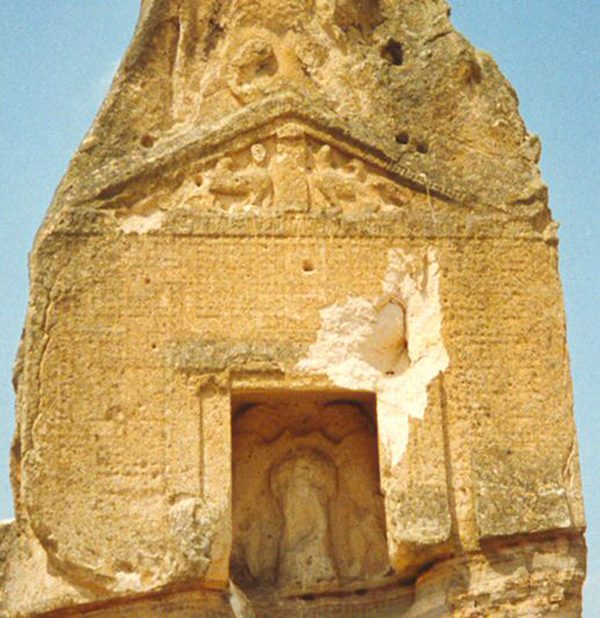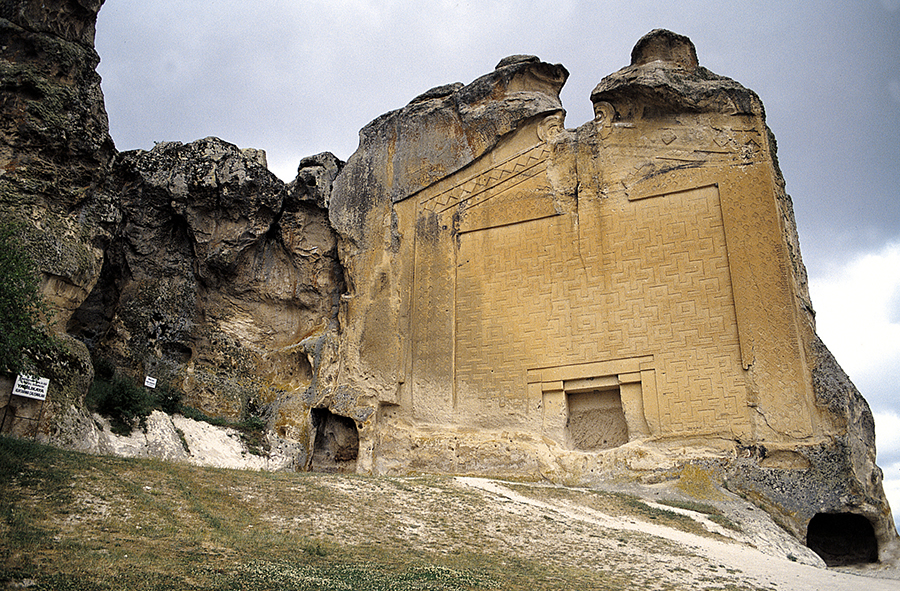a literary journal published by the Black Earth Institute dedicated to re-forging the links between art and spirit, earth and society
Mel Kenne
Phrygia / Remains
Lines for the Lion Goddess
Here’s what we saw
at Aizanoi:
a massive stone countenance
we stood before
and looked upon for
a long time,
as on some nameless
and inviolable law
that subsumed us with
the bright mask
of a green spring day
and sun burning down—
our faces left etched
by a closing claw.

Flanked by lions
rampant, her figure,
but she disfigured:
face chipped away,
elemental again: dust.
Now only a faint,
worn-down bust
framed by the posts
of a stone doorway.
Could it provide us
a way, a threshold
we might one day cross,
to attain sight of another,
more original stance,
a likeness equal to
the one long ago lost,
and bring light back
to despoiled immanence?

We may be reminded here
of stories we were told
of your furry ass’s ears
and baleful golden touch
that are not apparent now,
nowhere near this place
given over to centuries
full of wind-riven silence.
Not felt by us in this pure
light and air enclosing
sacred space where some
treasure more than fools’
gold must have once been
held dear, before it was
lost: stolen, profaned, or
just plain squandered.
Yet it seems to us that
another mystery must
have arisen here, a vision
that somehow got blurred
and was at last forgotten.
For now we can only see,
or imagine, from this
barren terrain, the sparse
evidence we survey, what’s
gone from shadow-filled
fissures scoring these
ochre and gray cliff walls,
and what’s left in this
late afternoon’s stillness
of golden light washed over
flaking volcanic ridges
and gaping cave mouths
whose burned-out interiors
defaced by looters now
only contain their own
stale air and silence.
Yet nothing spared, no
trace of an explanation
of what could’ve passed here
but that which remains
and lies before us as
the one certainty we face,
rendered exquisitely clear.
Yilantaş
The royal lion overthrown,
its head tipped upside-down,
and the uroboral snake,
broken down to segments
scattered among a heap
of huge boulders, remain
to be seen and turned over
again and again in our minds,
which seek some restoration,
or restitution, a way we can
make something more of these
ruins than they appear to be,
as they rise before us now.
As if by such reconstruction,
we could finally come to
some understanding of our
own time’s ghosts, our loss.
Like detectives who brood
over a pile of half-erased clues,
we lean above a bounty of
corpses collapsed long ago
to a film of white dust in
this litter of broken sarcophagi
and looted tombs. Nothing
you can really put your
finger on that’s not already
been clearly and officially
sealed by the stamp of doom.
*
Or do we only seek to
refill the gaps we now see
occupied by these cheerful
armies of picnicking families?
The adults gathered around
their small cooking fires,
seated upon faded kilims
covered by intricate webs
of red, blue and yellow ancestral
designs, woven into the rich
earth tones and fresh green
textures of their surroundings.
And the pure, liquid gaze
of children whose curious
stares hang not on the losses
of past centuries, but upon
these funny-faced foreigners
poking around, scrambling
over the stone blocks filling
their sunny playground.
Mel Kenne is the author of six books of poetry. His most recent collection, Take, was published in 2012 by Muse-Pie Press. In 2010 Yapi Kredi Publishers in Istanbul published a bilingual collection of his poetry, Galata’dan / The View from Galata, in Turkish and English. His second book, South Wind, won the 1984 Austin Book Award. In 2010 he was one of the Nazim Hikmet Poetry Award winners. He recently retired from the Kadir Has University Department of American Culture and Literature in Istanbul, Turkey, but he continues to live in the city that he feels is still the heart of the world.
©2025 Black Earth Institute. All rights reserved. | ISSN# 2327-784X | Site Admin